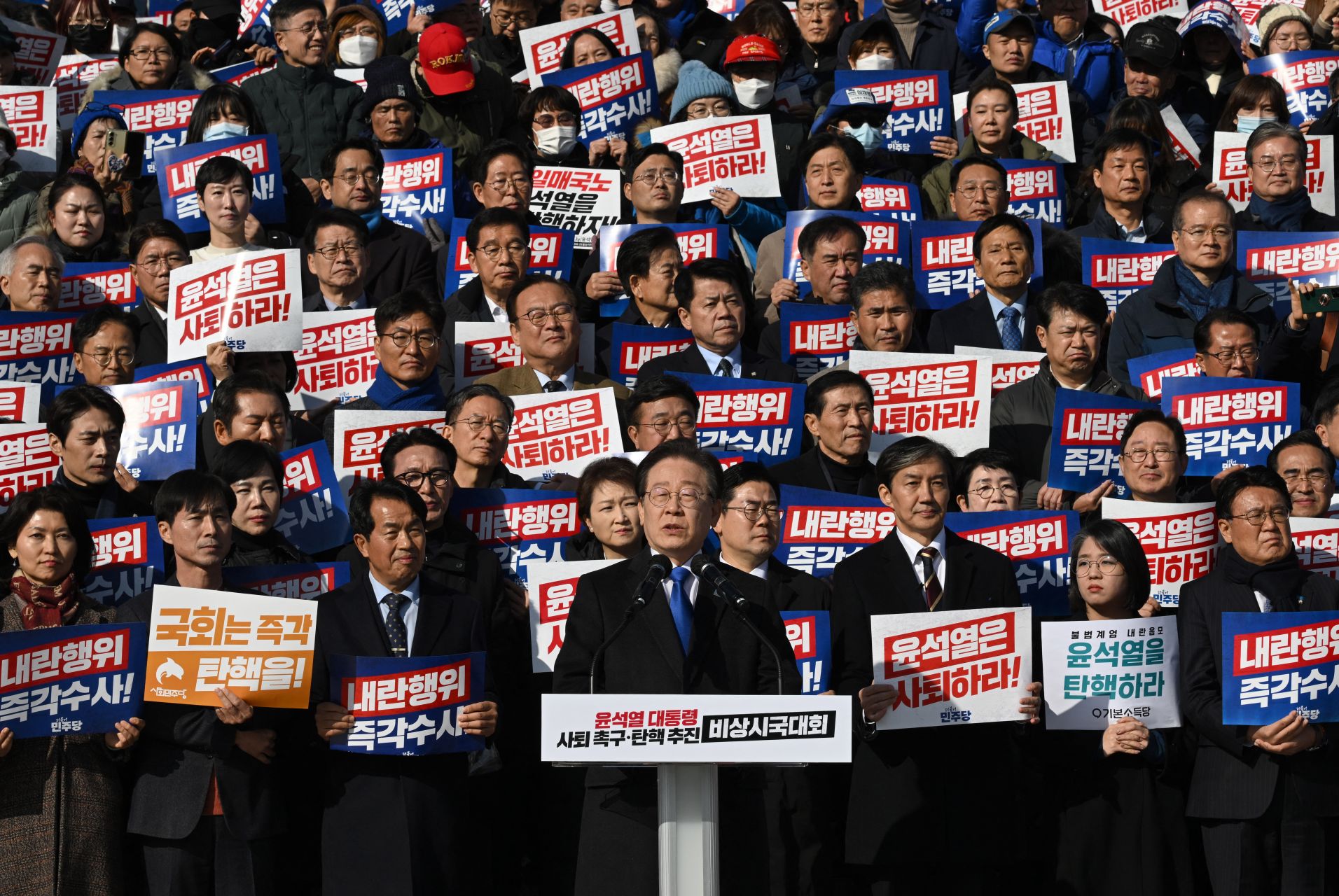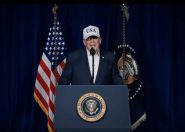- Home
- Middle East
- South Korean President Accused of Major Constitutional Violations in Impeachment Motion

Main opposition Democratic Party leader Lee Jae-myung (C) speaks during a rally against President Yoon Suk Yeol at the National Assembly in Seoul on December 4, 2024 ©Jung Yeon-je / AFP
South Korean President Yoon Suk Yeol violated the constitution by declaring martial law in a move aimed at evading criminal investigations, according to an impeachment motion seen by AFP.
Yoon "gravely and extensively violated the Constitution and the law", the motion filed by opposition parties earlier Wednesday says.
It also said his decision to impose martial law was "with the unconstitutional and illegal intent to evade imminent investigations... into alleged illegal acts involving himself and his family".
Yoon also deployed military and police forces to blockade the National Assembly, detained certain members of parliament, and restricted free access to the assembly, the motion said.
"These actions significantly hindered lawmakers from attending meetings to demand the lifting of martial law. Such measures constitute a direct violation of the principle of separation of powers and represent unconstitutional actions that infringed upon lawmakers' rights to deliberate and vote, as well as their parliamentary immunity," the motion said.
Yoon was later forced to rescind the order in the early hours of Wednesday after parliament voted it down and as thousands of people demonstrated.
Defiance
In his late-night television announcement, Yoon declared martial law, citing the threat of North Korea and "anti-state forces".
More than 280 troops backed by 24 helicopters arrived at parliament to lock down the site.
But 190 lawmakers defied rifle-carrying soldiers to force their way into parliament to vote against the move.
This left Yoon with no choice but to retract his decision and call off the military in another television address at around 4:30 am (1930 GMT Tuesday).
Under the constitution, martial law must be lifted when a majority in parliament demands it.
Senior aides working for Yoon offered Wednesday to resign en masse over the martial law declaration.
By mid-afternoon, Yoon had yet to reappear publicly.
'Impeachment'
The U-turn prompted jubilation among flag-waving protesters outside parliament who had braved freezing temperatures to keep vigil through the night in defiance of Yoon's martial law order.
Lim Myeong-pan, 55, told AFP that Yoon now has to go.
"Yoon's act of imposing it in the first place without legitimate cause is a serious crime in itself," Lim told AFP.
"He has paved his own path to impeachment with this."
With more protests expected through Wednesday, large numbers of police were patrolling key avenues Wednesday afternoon.
"I was so incensed I couldn't sleep a wink last night, I came out to make sure we push out Yoon once and for all," 50-year-old Kim Min-ho told AFP at a fresh demonstration at the assembly Wednesday.
'Anti-state' elements
Yoon had said that his imposition of martial law was to "safeguard a liberal South Korea from the threats posed by North Korea's communist forces and to eliminate anti-state elements plundering people's freedom and happiness.".
Yoon did not elaborate on the North's threats, but the South remains technically at war with nuclear-armed Pyongyang.
"Our National Assembly has become a haven for criminals, a den of legislative dictatorship that seeks to paralyse the judicial and administrative systems and overturn our liberal democratic order," Yoon said.
The president labelled the main opposition Democratic Party "anti-state forces intent on overthrowing the regime".
In recent weeks Yoon and his People Power Party have been bitterly at odds with the opposition over next year's budget.
Opposition MPs last week approved a budget plan through a parliamentary committee that slashed Yoon's spending plans.
His approval rating dropped to 19 percent in the latest Gallup poll last week, with voters angry at the state of the economy as well as controversies involving his wife, Kim Keon Hee.
Concern, relief
Democratic South Korea is a major ally of the United States, which has nearly 30,000 troops in the country to protect it from the nuclear-armed North.
Washington said it had no prior notice of Yoon's plan to impose martial law and welcomed his decision to reverse his move.
"We continue to expect political disagreements to be resolved peacefully and in accordance with the rule of law," US Secretary of State Antony Blinken said.
China, a key ally of North Korea, urged its nationals in the South to stay calm and exercise caution, while Japan was monitoring the situation with "exceptional and serious concerns".
"This is a surprising last-ditch move by Yoon to grab political power," Gi-Wook Shin, a sociology professor at Stanford University, told AFP.
"This move will only fasten the demise of his political career as it is likely to lead to his impeachment."
With AFP
Read more



Comments